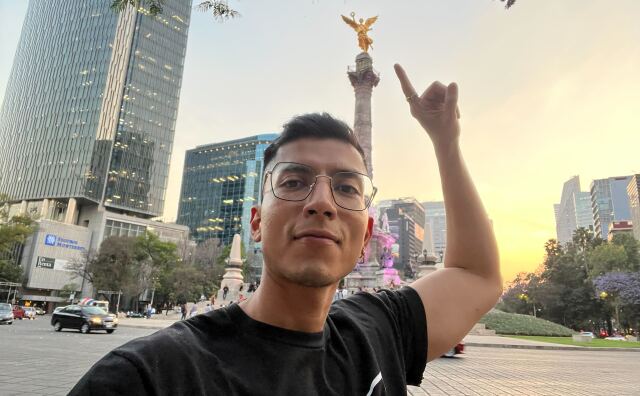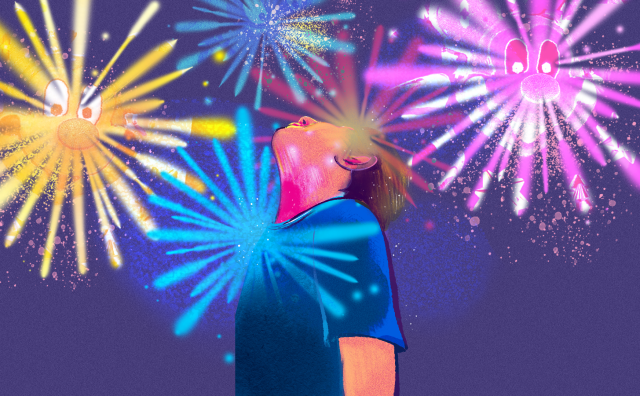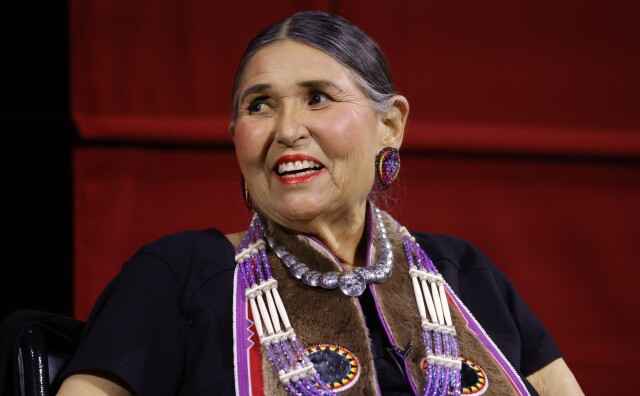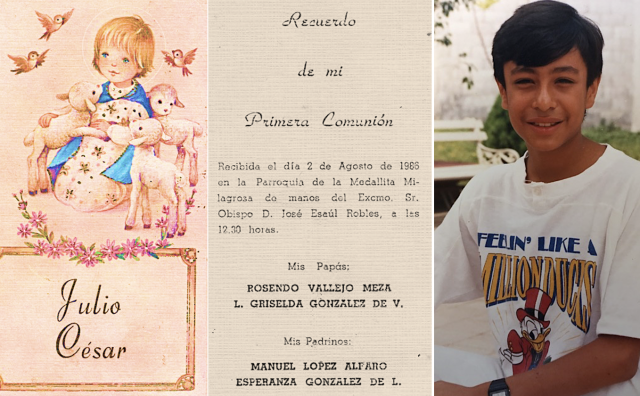‘Spy In The House Of Race’: A Daughter Of Black, Chinese, And Jewish Parents On Belonging Everywhere And Nowhere

I'm an American of African, Asian, European, and Native descent.
-
From June 2020 to July 2021, we published your stories each week to continue important conversations about race/ethnicity, identity and how both affect our lived experiences. We now have a new series Being American, which is again soliciting your essays.
-
Read:
I’ve lived all over the world and have been taken for many things. I describe myself as multi-racial, Mixed in America, blended. I tend to reject the hyphen — I see it as a little plank that walks us off our citizen ship. By us, I mean we people of color other than white. I have too many planks to walk as a Black, white, red, yellow — therefore, tan — American.
I’m nobody's All-American, a spy in the house of race.
Ethnicity shapes what I eat, what music I listen to, what I read, and who I keep as company. It defines culture, family, history, and aesthetics.
I am the bloom of my ancestors. A vessel filled with genetic memory. That, and memories of otherness. Here are some of them.
Paris, Bus Stop
I am 19 years old, standing at a bus stop in Paris. I'm an American on a “junior year abroad” in college. An older gentleman, a Frenchman, with an overcoat and cane, is standing next to the bench as we wait. He turns to me and tsks.
How sad, he says, shaking his head...to be so beautiful, but to be Algerian.
"I'm not Algerian!" I reply, suddenly filled with shame for even responding.

I have learned that people see themselves in me, or whatever they are closest to, or know with familiarity — they can recognize it in me.
When I'm in France, I'm seen as Algerian. When in NYC, my birthplace, I'm seen as Puerto Rican, Colombian or Brazilian. I'm not. Hispanic is the one thing I'm not. But I do speak Spanish, which I learned growing up in New Mexico, so I carry that cultural identity too, through language and food. I'm Sorta Rican.
Which leads me to another memory.
Los Angeles, Party
I'm 21 in Los Angeles now, having a party, and some guy I didn't invite is hanging against my wall as the party is winding up.
"What are you?" he slurs drunkenly. "I've been watching you...and what are you?" It's late and there's been a lot of revelry and booze.
I don't feel like getting into it, so I tell him I'm a Virgo. He gets upset and starts lecturing me about how I should be proud of my race. Look at him, he keeps saying — he's a proud Irishman from Boston, so I should be proud of being Puerto Rican or Mexican, or whatever I am, and not ashamed, he goes on — never be ashamed!
“What are you?” he asks again.
And then I kinda snapped and said I was none of his business.
Hollywood, Audition
I'm 24 and auditioning for a Disney movie about a family that moves to Africa and discovers themselves. The casting director is Black and is known for working with Spike Lee. Two seconds into my reading of the part — the young girl of the family, who falls in love with what the script calls "a native Black boy," he stops me and asks, "Are you a Sister?"

"Is the character a Sister?" I ask.
"No," he says.
"Then I am not your sister," I reply.
"Ah, no, I can tell by your bubble butt that you're a Sister," he says.
Oh, really?
He explains that all compelling stories are told in high contrast. That he can't send a Black girl before the producers when they are looking for a white girl for the part. They will think he’s pulling the wool over their eyes. But well, I am “white" — at least, I look white — I mean, my skin is pretty white. It's like, why I'm named Lili.
But I digressed. And I did not get the part.
L.A., Human Resources Office
I am 26 in the human resources office of a big educational nonprofit in Los Angeles.
“It’s a pity you are not a minority hire,” says the HR director, a friendly-looking strawberry blonde.
“But I am,” I reply.
“No, I mean, a real minority,” she insists.
“My mom is Black and Chinese. My father is Jewish.”
“So, you’re only a quarter Black? We need a full minority.”
“Um, by that logic I’m half ‘minority’ and half ‘majority’ which makes me fully in the minority.”
Didn’t get the job.
How I Got Here
My mother was born in Watts, on the floor of her home on Compton Avenue. She and her sisters used to watch Simon Rodia build the towers. She is the youngest of 10.

Her father was a Chinese national of Mongolian descent, a western-trained doctor who could not practice medicine in the U.S. following the Chinese Exclusion Act of 1882. He opened an herb shop and restaurant in L.A’.s Chinatown. Her mother was a Black woman from Tennessee who came west, fearing for her life in the South.
Together, they raised their children in segregated Los Angeles, in a grid of red-lining.
My father was born at Cedars-Sinai in Los Angeles. His family lived in the San Fernando Valley, his father a successful film and TV editor (“Gunsmoke,” “The Twilight Zone,” “Lonely are the Brave,” to name a few), his mother a painter.
This family knew wealth and land ownership, and could afford the arts. They raised two children in North Hollywood and lived in a mid-century modern home built on commission by Richard Neutra.

My father was born into prosperity and position. My mother was born into poverty and displacement. In summer, as children, my mother picked cotton in Bakersfield while my father went to the Magic Flute at the Hollywood Bowl, or to Grauman’s Chinese Theatre for the latest releases.
My parents met at a party in Hollywood, when my mom was in her senior year at Marshall High School and my father was a senior at UCLA.
I came along a few years later.
When I was in elementary school, my mom told me a story about her own mother’s advice on dating. Her mother’s advice? Marry a white man — you have to think of the children. This was a Black woman’s advice to her own children in post-war Los Angeles.
My grandmother’s experience of being Black in America was so bad that she, like many others coming out of the South, hoped that by “lightening up the race,” her children and theirs might be spared the shackle of Black skin in America.
As her grandchild, I am that spy in the house of race who is included in many circles, but exists without a circle of her own, the perennial insider who lives outside. The things I have heard in those many houses can fill books.
Albuquerque, Horns
I am nine years old in Albuquerque, New Mexico. We’ve just moved from Santa Fe, which felt like a big city compared with this farming neighborhood in the Northwest Valley next to the Rio Grande. It’s farmers mostly, and mostly Catholic. I make friends with the neighbors — they have a little girl, a year younger than me, named Patty. We become fast friends.
Her parents refer to themselves as Spanish — not Mexican or Chicano — because their family came from Spain, and they are Castilian. One day while playing in the yard, Patty sidles up beside me and asks if she can see my horns.
“My what?” I ask.
“Your horns,” she says, and explains that her mother said all Jews have horns. Flummoxed, I let her inspect me and very gingerly, she parts my hair to search in vain. “You don’t have any!” she exclaims, “I knew you weren’t Jewish!”
Connecticut, Otherness
I am 16 and living in Connecticut when I write the following poem, “They Call Me Other:”
I call to them
My family tree
My support and foundation
My family weed
You can’t swing from a weed
I call to them
And they call me Other
No Tears for the Mixed Girl
Ibiza, In Love
I am 20 and in Ibiza, Spain with my boyfriend I plan on marrying. We are at his French parents’ house. It’s a dinner party with a Western theme and I’ve been asked to make enchiladas because I’m from New Mexico. There is a Texan among us at the table of mostly French and Spanish.
“What are you, darlin’?” asks the Texan.
“I’m mixed,” I tell him, “My mother is Black and Chinese, my father is Jewish.”
Suddenly the table goes quiet and after the angel has passed, the mother of my fiancé asks, “So, risk having Black children?” (That angel was my dead, Black grandmother.)
I didn’t say “It’s a risk I have to take.” That would have been clever, something I dream of saying when I replay the scene in my head. But when you get hit in the face with the two-by-four of colorism, you kind of freeze up inside. My reaction was a demure and exhaled-breath “Mais oui.”

Though we were officially engaged three times over a period of 10 years, we never married, he and I. Ironically perhaps, his younger brother did marry a American woman of African descent, and they have two children who are identifiably Black and beautiful — the risk being well worth it, as I am sure their grandmother will now attest.
My first boyfriend in college was — and still is — Jewish. When it came time to meeting his parents, he quipped that they would like half of me — the Jewish half.
We did not get married, either.
In love, I got to the point of comedy where I would tell people that I was looking to marry a Black, Mongolian, Jewish Native, in order to keep my race pure.
Either the joke’s on me or I am lucky in love, but either way, I am still unmarried. Though I have met my match — a Jamaican. Out of many, one people.
We Americans could learn a lot from our E Pluribus Unum brethren in Jamaica. Like Malcolm suggested, every American should spend some time in a Black-run, Black-majority, Black-empowered country, in order to witness true social freedom among Black people.
My Jamaican Guy will not return to America — nevah! In America he’s a Black man, whereas in Jamaica, he’s a Jamaican — he gets a whole country. Here, he can’t drink on the street, smoke on the street, walk on the street without risking his life, liberty, and pursuit of happiness. In Jamaica he can do all dat and more. Out of many, one person. That’s me. I feel at home in Jamaica — more welcome at times than here at home.

They have their issues, too. If you’ve ever been in a roomful of West Indians you have perhaps been privy to their conversations about “Black Americans.”
“Dem lazy!” you will often hear them say. They don’t understand American housing covenants or other restrictions that have limited homeownership, work, health, wealth, and family in the U.S. They are a freer people, who have known equality under the law longer than we Americans.
Yet while I feel part of everything, here in my own home, I am seen as part of nothing. With all those hyphens, I am everything and nothing at once, a peripatetic native, deeply rooted in a loamy nothingness. Tetherless. I've had directors tell me they can't see me on TV, because they can't imagine what my family looks like. As though I come from nowhere.
‘Lost In The Shuffle’
I've had agents say they won't represent me because they feel my "racial ambiguity might cause me to be lost in the shuffle.” In a “type”-driven industry, not having one is seen as a problem. People can’t see what they don’t know.
Coming up in the '90s, I thought being multiracial would open casting doors for me. As in love, it closed many more doors than it opened.
Even the one part that was written specifically for me, a Black Mongolian Jew (really), was changed to Armenian, because the producers thought the truth was "too unbelievable."
That was then. Today, I watch “Mixed-ish” and wonder how to get seen for the part of Meghan and Harry’s nanny, IRL. (Seriously, they need me.)
A Spy In The House Of Race
I’ve learned that what we call race is really nothing more than the effects of the environment on our skin and what we consume — that humans, like all living things, are products of their environment. Much like plants, there are many varieties of humans, depending on which way the sun hits your family tree.
If your ancestors come from places where the sun shines all the time, you will have melanin in your skin to protect you from the sun’s rays. If your ancestors come from snowy or overcast climes, they will be pale. If they come from lands where it rains, where the sun hits the snow or water, they may have developed an epicanthic fold to protect from the glare.
We are nothing more than reflections of our environment. As in companion gardening, there are some varieties that fight for root space. There is room enough in the garden for all that’s planted here. None of us are the gardener — we are just one of the species growing here.

As a spy in the house of race who travels, one learns that each culture has a darker brother still waiting for a place at the table, to cite Langston Hughes’ seminal poem, “I, Too.” Everything with roots is capable of racism. Colorism — social caste systems based on skin color — exist among all cultures. It happens in Asian cultures, where the darker the skin, the poorer the stature — those most touched by the sun wear the marks of their labor beneath the sun, on their skin. The wealthy used umbrellas so as not to be touched by the sun, like a laborer or the enslaved.
It happens in Latin America, India, Africa, the Middle East, and Europe too. The fairest skin is often held to ideal. All over the globe, there are people who bleach their skin.
Slavery too, is a human foible. I was surprised to learn that slaveholding is something only humans and certain insects (like bees, wasps, and ants) do. No other species makes slaves of others. Humans and insects are the only species that take other bodies prisoner for work or pleasure. Humans should strive to evolve above and beyond it.
Through the multi-perspective lens of diversity, one sees that fear is innate and trust is learned. We are all born fearful of that which we do not know, or that which is unfamiliar. This is a basic survival instinct for humans, a creature born utterly dependent on its primary caregiver for a very long time. Fear is the flip side of hate. Love is the flip side of trust. We learn to love and evolve to overcome the fears we are born with, provided we know loving relationships.
If we humans could take responsibility for our basic instincts to war and pillage and make slaves of others, like the giant murder ants we apparently are, perhaps we can evolve to a higher plane of mutual trust and respect.
There’s room enough for all that’s planted here. Provided we do not destroy ourselves along the way, or the garden we inhabit.
-
Lili Nadja Barsha is an American performer, writer, director, and snapshot photographer living in Los Angeles. The author of 365 Days of Humiliation, A Year in the Life of an Actress; Blue Lips and Red Uglies, a collection of poems; and maker of “Haunted Cabaret," a Halloween-themed variety show whose last incarnation was produced by Borreby Castle Theatre in Denmark. Lili is graduate of Yale University. Spy in the House of Race is an excerpt of a larger work called Mixed in America, which she hopes to publish.
-
My good friend used advance parole to leave the country and return. Now it's my turn to go back "home."
-
When you grow up in Anaheim close enough to watch Disneyland fireworks every night while your family can’t afford to go, you can’t help but feel like you’re on the outside looking in.
-
She sat down with us in April, nearly 50 years after the night she turned down Marlon Brando's Best Actor Oscar — which is still among the most memorable and contentious in Academy Awards history.
-
Latin America is no stranger to racism and colorism — just turn on a telenovela and see for yourself. And it’s alive and well in our own communities here in the U.S.
-
When you grow up identifying as "half white and half Mexican," the task of choosing what box to check on a government form isn't easy.
-
Growing up as the son of a Filipino immigrant dad and Russian American mom, Mark Moya felt equally attached to both cultures. He still does. Lately, he's been thinking more about their immigrant legacy and how it shaped him, especially after losing his dad earlier this year to COVID-19.











